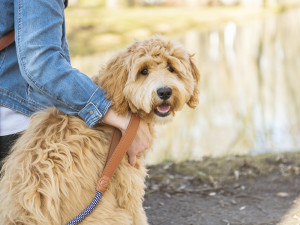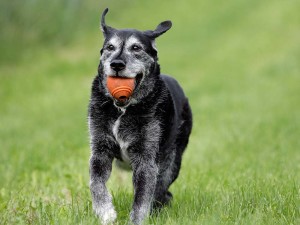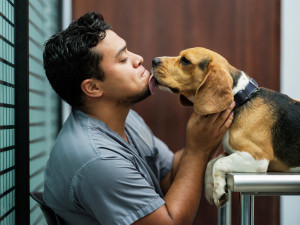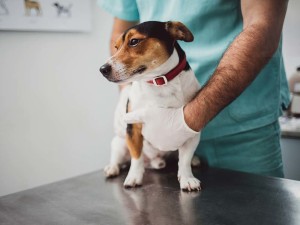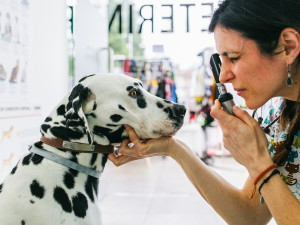What to Do If Your Dog Has a Slipped Disc
A veterinary neurologist explains all

Share Article
Unfortunately, slipped discs aren’t just the painful result of a human going too hard during an at-home exercise class in their living room – they can affect dogs, too. It can be very scary to hear your canine companion might have a slipped disc, but rest assured there is a lot you can do for them in terms of treatment and helping to make them more comfortable – and it may be simpler than you think.
As a vet who specialises in neurology, there are a few variations of slipped discs that we see in dogs, but I’m going to focus on one of the most common types, which we call an ‘intervertebral disc extrusion’.

Get (totally free) deals for food, treats, accessories, tech and way more pet parenting must-haves.
opens in a new tabWhat are invertebral discs?
Like humans, dogs have intervertebral discs along their back. Imagine a jam doughnut with a spongy exterior and jelly centre (sorry for the off-putting imagery) – that's pretty much all an intervertebral disc is. The outer part is called the annulus and the inner part is called the nucleus; the discs sit in between the spinal bones (vertebra) and help cushion the movements that allow your dog to bound aroundopens in a new tab and jump to catch balls.
How do invertebral discs in dogs ‘slip’?
Discs can degenerate slowly over a dog’s lifetime, but in some breeds this degeneration happens more quickly, and the usually liquid jelly centre turns hard and becomes calcified. This can then lead to the centre bursting out into the area where the spinal cord sits. This is called an ‘intervertebral disc extrusion’. This can then bruise and compress the delicate spinal cord. Early and calcified degeneration occurs in chondrodystrophic breeds (those that have short legs and long backs), which include Dachshunds, French Bulldogs, Cocker Spaniels, Cockerpoos, Pekingese and Lhasa Apso.
What are the signs my dog has a slipped disc?
In mild cases, your dog may appear in pain or discomfortopens in a new tab. As they can’t tell you this with their words, they may express this by whimpering, yelping, reluctance to move and having a hunched back. Some dogs will also go off their food. If the slipped disc is in their neck, then they may not move their head around and hold it very low. Some dogs may appear wobbly and weak in their legs, too. In more severe cases, the dog may lose the ability to walk or move their legs completely; and in the most severe cases, they may lose the ability to feel their legs.
If your dog has lost the ability to use its back legs, it is very likely they will also lose the ability to pass urine as the bladder is controlled by similar parts of the spinal cord. Most dogs continue to pass poo just fine (small mercies).
I think my dog might have a slipped disc, what do I do now?
Firstly, don’t panic! The majority of slipped discs get better with rest and pain relief. However, If you suspect your dog has a slipped disc, you should make an appointment with your vet right away. Your vet will examine your dog and perform a neurological examination to try and understand the location and severity of the slipped disc. They will also be able to give your pup medication to help with pain, and if they cannot pee they can help express their bladder, too. Although slipped discs are common, there are other conditions that can cause similar symptoms, so your vet may advise referral to a veterinary specialist for assessment and a possible MRI or CT scan.
What treatment options are available?
The vast majority of slipped discs in dogs improve with strict cage rest and pain relief, known as ‘conservative management’. Although hard to believe, even dogs that lose the ability to walk from a slipped disc can recover without surgery. However, it is very important that you follow your vet’s advice and stick to the treatment plan. It may seem hard to rest your dog at first, and it can feel like you’re being mean by keeping them indoors and not letting them play, but it is important and in their best interest to be as strict as you can – don’t succumb to the puppy-dog eyes!
There are a few things you can do to enrich their lives while they are resting and not going out for walks. Examples include bringing interesting smells from outside to them, brain training games such as puzzle feedersopens in a new tab, and extra cuddles and TLC.
Some of the more severely affected dogs, particularly those that have lost feeling in their legs or are getting worse despite conservative management, may require surgery to remove the slipped disc material and decompress the spinal cord. This is usually done by a specialist veterinary neurologist in a specialist hospital. They will likely stay in for a few days while they recover from the surgery and receive pain relief, rest and physiotherapy, and have their bladder managed if they cannot urinate.
Physiotherapy by a registered canine physiotherapist can help with your dog’s recovery. Your neurologist or vet should be able to advise the best places in your local area and some exercises you can do at home.
What is the prognosis? And can it happen again?
The outlook for a disc extrusion is usually very good. Most dogs will make a full recovery; however, some dogs may have a slightly wobbly walk long term. Unfortunately, some dogs will have a recurrence of signs in the future and a small amount will not recover.
Is there anything I can do to prevent it?
Sadly, you cannot prevent slipped discs as they occur due to a multitude of reasons, and genetics play a big part. However, keeping your pet a healthy weightopens in a new tab and encouraging them to lead an active lifestyle may help.
A slipped disc can be a scary concept for a dog parent. But rest assured that the majority of cases will make a good recovery, even without surgery. Conservative management involves strict rest and pain medication, and can be very effective for treatment. If you suspect a slipped disc, it is important to seek veterinary care promptly and follow any instructions given by your vet carefully.
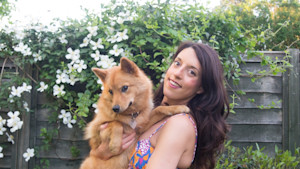
Dr Georgina Harris, MRCVS, DipECVN
Georgina Harris is a veterinary neurologist whose career started at the Royal Veterinary College. She then went on to specialise in neurology and neurosurgery at Cambridge University. Georgina enjoys all aspects of neurology. Outside of the clinic, she can be found travelling round the UK in her campervan with her trusty canine companion Olive, the Finish Spitz.
Related articles
![beagle at the vet]() opens in a new tab
opens in a new tabWhat is Sterile Meningitis in Dogs?
Meningitis can be a scary word to hear, but it’s not as bad as you might think – a vet explains the signs to look out for and the treatments available
![Girl sleeping with her French Bulldog dog in bed.]() opens in a new tab
opens in a new tabA New Study Finds Flat-Faced Dogs Get Pretty Crappy Sleep
It’s one of several health problems facing brachycephalic breeds
![Veterinarian examining a dog]() opens in a new tab
opens in a new tabHGE in Dogs: Causes, Symptoms and Treatment
Certain symptoms could mean your dog is battling a potentially fatal condition called haemorrhagic gastroenteritis (HGE). Here’s everything you need to know
![Young woman with her senior dog in the autumn park.]() opens in a new tab
opens in a new tabEverything You Need to Know to Care For Your Senior Dog
Your older dog is the love of your life. Here are some health issues to look out for
![Young female veterinarian in her consulting room performing a medical examination on a dog for diabetes]() opens in a new tab
opens in a new tabDiabetes in Dogs: Symptoms, Treatment and Prevention
Learn which breeds are at risk, the symptoms to look out for and what treatment options are available.
![A dog coughing]() opens in a new tab
opens in a new tabKennel Cough Is the Worst. Here’s What You Need to Know About it
Kennel cough has been making headlines, but you can prevent your pup from catching this super-contagious disease. (Hint: there’s a vaccine)

